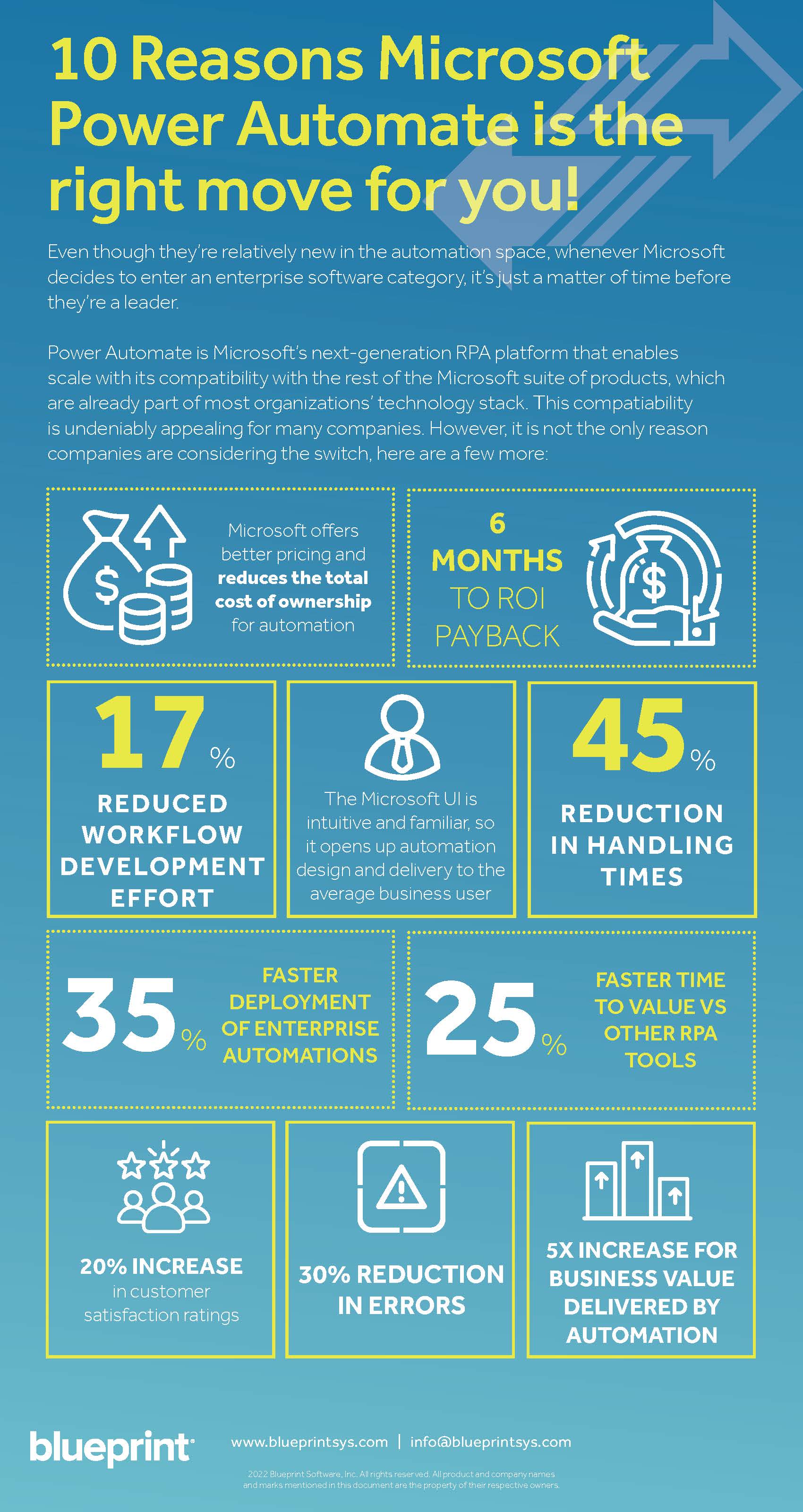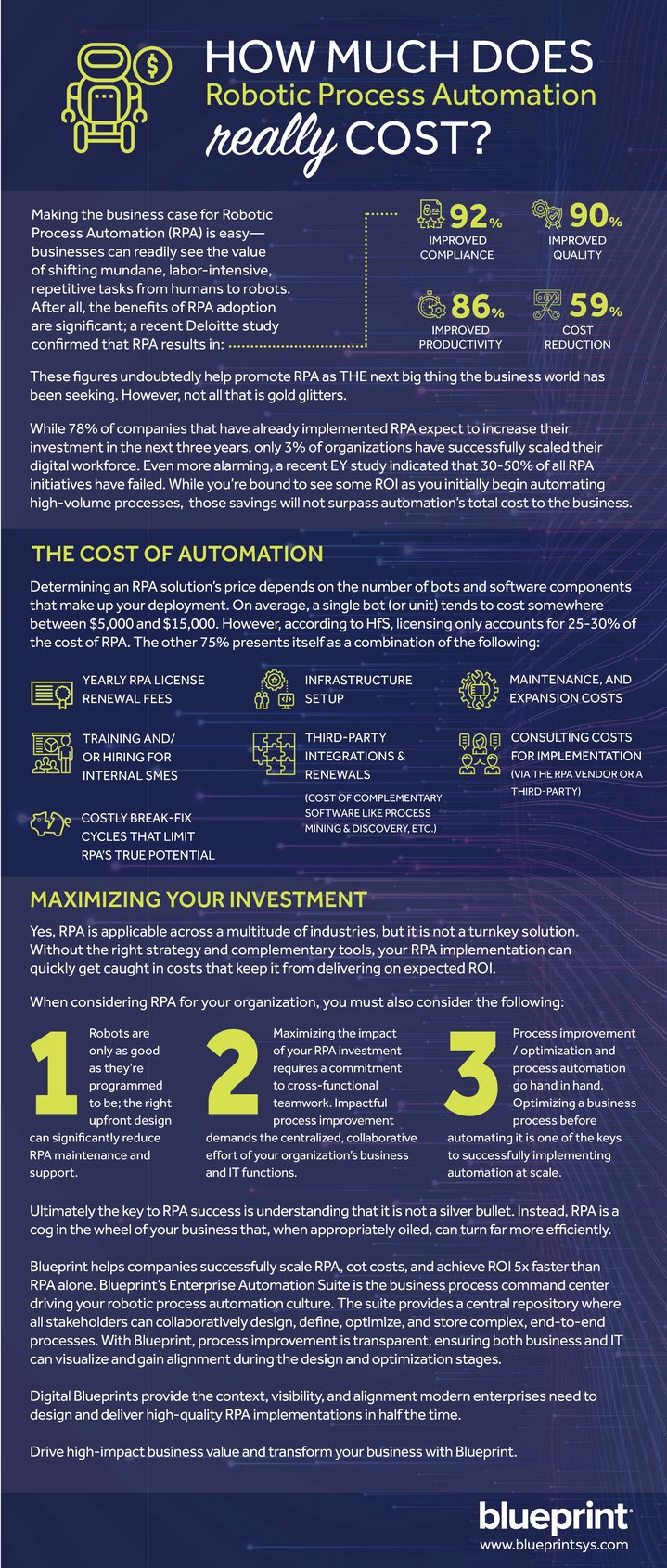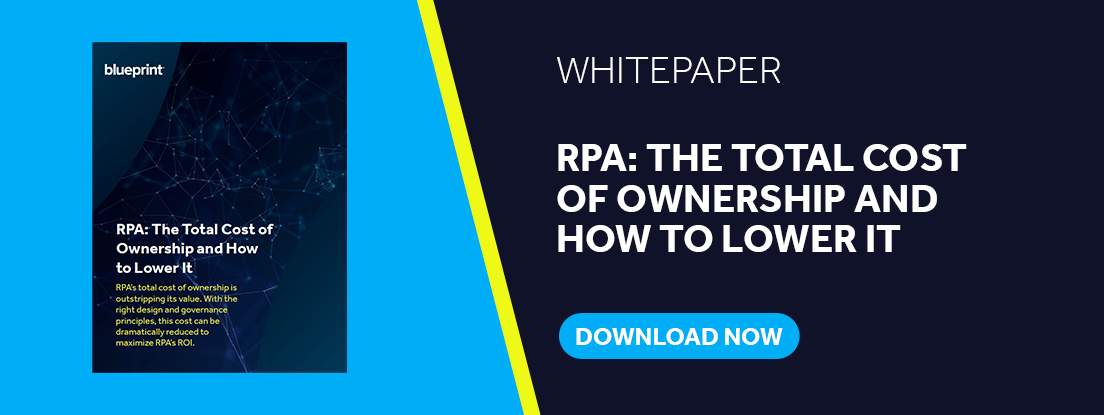INFOGRAPHIC: How much does Robotic Process Automation (RPA) Really Cost?
How much does Robotic Process Automation (RPA) really Cost?
Making the business case for Robotic Process Automation (RPA) is easy—businesses can readily see the value of shifting mundane, labor-intensive, repetitive tasks from humans to robots. After all, the benefits of RPA adoption are significant; a recent Deloitte study confirmed that RPA results in:
- 92% improved compliance
- 86% improved productivity
- 90% improved quality
- 59% cost reduction
These figures undoubtedly help promote RPA as THE next big thing the business world has been seeking. However, not all that is gold glitters.
While 78% of companies that have already implemented RPA expect to increase their investment in the next three years, only 3% of organizations have successfully scaled their digital workforce. Even more alarming, a recent EY study indicated that 30-50% of all RPA initiatives have failed. While you're bound to see some ROI as you initially begin automating high-volume processes, those savings will not surpass automation's total cost to the business. Rising costs and underwhelming ROI is one of the main motivators driving RPA platform migrations as automation programs look for better returns elsewhere.
The Cost of Automation (RPA)
Determining an RPA solution's price depends on the number of bots and software components that make up your deployment. On average, a single bot (or unit) tends to calculate in cost somewhere between $5,000 and $15,000. However, according to HfS, licensing only accounts for 25-30% of the cost of RPA. The other 75% presents itself as a combination of the following:
- Yearly RPA license renewal fees
- Training and/or hiring for internal SMEs
- Consulting costs for implementation (via the RPA vendor or a third-party)
- Infrastructure setup
- Third-party integrations and renewals (cost of complementary software like process mining, process discovery, etc.)
- Costly break-fix cycles that limit RPAs true potential
Maximizing your ROI for RPA
Yes, RPA is applicable across a multitude of industries, but it is not a turnkey solution. Without the right strategy and complementary tools, your RPA implementation can quickly get caught in costs that keep it from delivering on expected ROI.
When considering RPA for your organization, you must also consider the following:
- Robots are only as good as they're programmed to be; the right upfront design can significantly reduce RPA maintenance and support.
- Maximizing the impact of your RPA investment requires a commitment to cross-functional teamwork. Impactful process improvement demands the centralized, collaborative effort of your organization's business and IT functions.
- Process improvement/optimization and process automation go hand in hand. Optimizing a business process before automating it is one of the keys to successfully implementing automation at scale.
Ultimately the key to RPA success is understanding that it is not a silver bullet. Instead, RPA is a cog in the wheel of your business that, when appropriately oiled, can turn far more efficiently.
Blueprint helps companies successfully scale RPA, cut costs, and achieve ROI 5x faster than RPA alone. Blueprint's Enterprise Automation Suite is the business process command center driving your robotic process automation culture. The suite provides a central repository where all stakeholders can collaboratively capture, design, define, optimize, and store complex, end-to-end processes. With Blueprint, process improvement is transparent, ensuring both business and IT can visualize and gain alignment during the design and optimization stages.
Digital Blueprints provide the context, visibility, and alignment modern enterprises need to design and deliver high-quality RPA implementations in half the time.
Drive high-impact business value and transform your business with Blueprint. Watch our on-demand webinar here to discover how your organization can lower RPA's total cost of ownership and maximize ROI.
Share this
Recent Stories

How to Reduce the Rising Costs of RPA Maintenance and Support

Why RPA Tools Were Never Able to Empower the Citizen Developer







